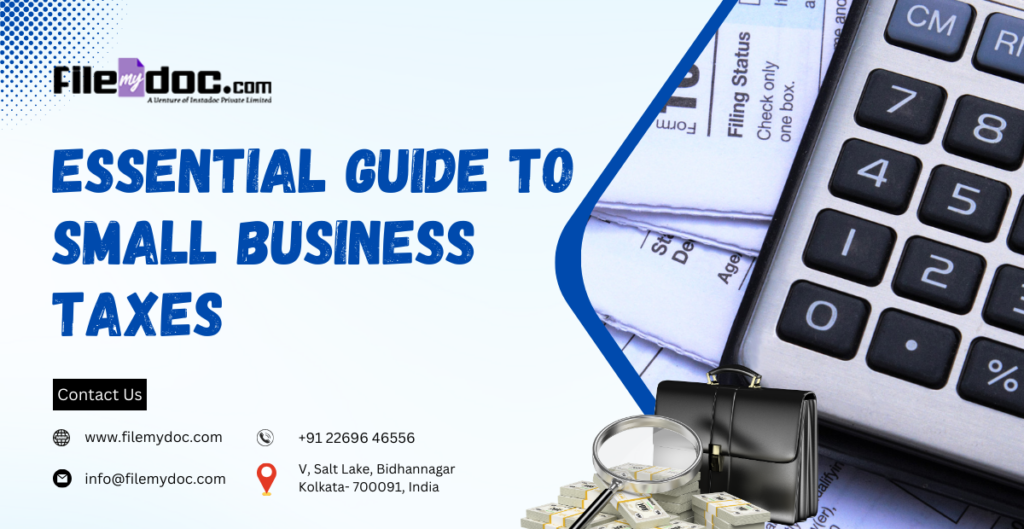Understanding small business taxes is crucial for entrepreneurs aiming to ensure compliance and optimize their financial management. Taxes can significantly impact a business’s profitability, so it’s essential to grasp the basics of how small business taxes work, what types of taxes apply, and how to manage them effectively. This guide provides a comprehensive overview of small business taxes, including key considerations and best practices.




Types of Small Business Taxes
Small businesses are subject to various types of taxes, each impacting different aspects of their operations. The primary tax categories for small businesses include:
1. Income Taxes
Income taxes are based on the business’s net income, which is the total revenue minus allowable expenses. The type of income tax a business must pay depends on its legal structure:
- Sole Proprietorships: Income is reported on the owner’s personal tax return using Schedule C (Form 1040). The business’s income is taxed at the individual’s personal tax rate.
- Partnerships: Partnerships file an information return using Form 1065, but the income is passed through to partners and reported on their individual tax returns. Each partner pays tax on their share of the profits.
- Corporations: Corporations file Form 1120 and pay corporate income tax. Shareholders then pay personal income tax on any dividends received.
- S Corporations: S Corporations file Form 1120S, and income is passed through to shareholders, who report it on their personal tax returns. This avoids double taxation at both the corporate and individual levels.
2. Self-Employment Taxes
Self-employment tax is required for individuals who work for themselves and includes contributions to Social Security and Medicare. For self-employed individuals, this tax is calculated based on net earnings from their business. The current self-employment tax rate is 15.3%, covering both the employer and employee portions of Social Security and Medicare taxes.
3. Payroll Taxes
Businesses with employees must withhold and pay payroll taxes, which include:
- Federal Income Tax: Withheld from employees’ wages based on their W-4 forms.
- Social Security and Medicare Taxes: Employers must match the Social Security and Medicare taxes withheld from employees’ wages.
- Federal Unemployment Tax Act (FUTA): Employers pay this tax to fund unemployment benefits.
- State and Local Taxes: Depending on the jurisdiction, businesses may also be responsible for state and local payroll taxes.
4. Sales Taxes
If a business sells goods or services subject to sales tax, it must collect sales tax from customers and remit it to the appropriate state or local tax authority. The sales tax rate and rules vary by state and locality.
5. Excise Taxes
Excise taxes apply to specific goods and services, such as gasoline, tobacco, and alcohol. Businesses involved in the production, sale, or use of these products must comply with excise tax regulations.
Managing Small Business Taxes
Effective tax management involves several key practices:
1. Keep Detailed Records
Accurate record-keeping is essential for tracking income, expenses, and tax obligations. Maintain organized records of all financial transactions, including receipts, invoices, and bank statements. This helps ensure accurate tax reporting and provides evidence in case of an audit.
2. Understand Deductions and Credits
Take advantage of available tax deductions and credits to reduce taxable income. Common deductions include business expenses like rent, utilities, salaries, and supplies. Research and apply for tax credits relevant to your industry or business activities.
3. Make Estimated Tax Payments
Small business owners may need to make estimated tax payments throughout the year to avoid underpayment penalties. Calculate these payments based on your expected tax liability and submit them quarterly to the IRS.
4. Consult a Tax Professional
Tax laws and regulations can be complex and subject to change. Consulting with a tax professional or accountant can help ensure compliance, optimize tax strategies, and avoid costly mistakes.
5. Stay Informed About Tax Changes
Tax laws frequently change, affecting small business tax obligations. Stay updated on relevant tax law changes and adjust your tax strategies accordingly to ensure continued compliance.
Conclusion
Navigating small business taxes requires a solid understanding of various tax types and effective management practices. By keeping accurate records, leveraging deductions and credits, and seeking professional advice, small business owners can manage their tax obligations efficiently. Proper tax management not only ensures compliance but also supports the financial health and success of the business.


























